Spicy and tangy Cabbage Chutney also known as Cabbage Pachadi features healthy cabbage with lentils. It also includes flavorful herbs, spices and tangy tamarind. This vegan recipe comes from the South Indian cuisine and is made without onion, garlic and coconut. Try this cabbage chutney with Idli, Dosa and you are sure to love it.
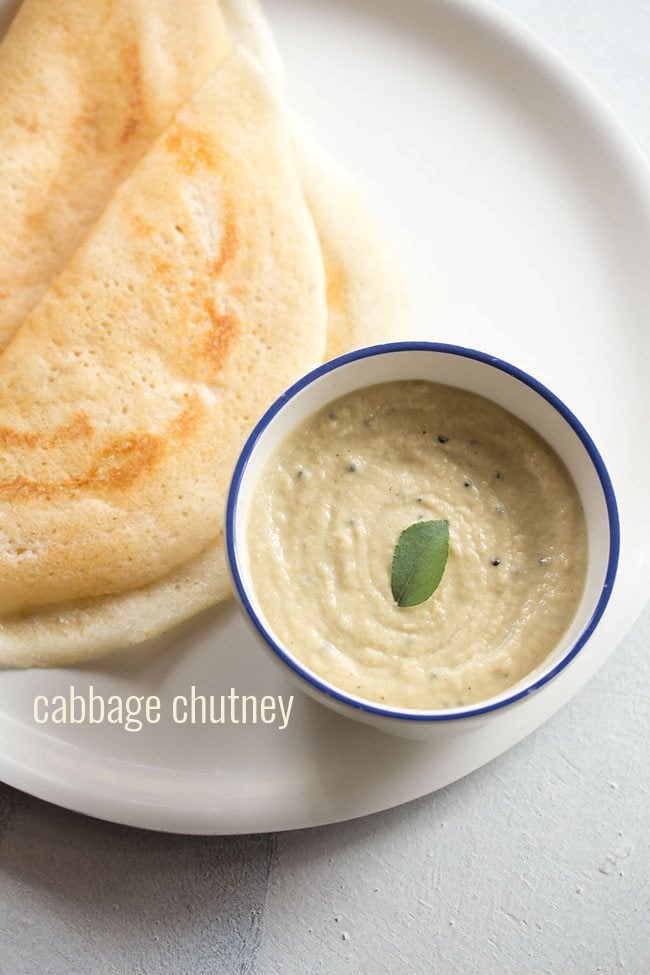
About This Cabbage Chutney
Cabbage is one of those veggies that is either liked or hated. Luckily in my home, we like cabbage and and I make many recipes with this flavorsome veggie. I have shared some Cabbage Recipes earlier on the blog.
In some recipes the taste and texture of cabbage is felt distinctly. But in some recipes, you will not even know that the dish has cabbage in it.
This cabbage chutney falls in the later category of recipes. It is difficult to guess there is cabbage in this chutney condiment.
In fact it tastes similar to Mango Chutney. The tamarind that is added in the chutney gives a sour and tangy taste.
As I have mentioned above, the recipe is also made without onions and garlic, plus a vegan recipe. I make this chutney recipe or Tomato Chutney or Onion Chutney to go with our South Indian breakfast of idli and dosa, when I run out of fresh coconut.
I love to make chutneys with various vegetables and fruits. Disguising veggies in a chutney is a good way to include them in your food or for your picky eaters.
How to Make Cabbage Chutney
Lets begin with the making of this unique cabbage chutney recipe.
Fry Lentils and Spices
1. Heat 1 tablespoon sesame oil in a frying pan. Add 1 teaspoon urad dal (split and husked black gram) and 1 teaspoon chana dal (split and husked bengal gram).
Swap any neutral oil in place of sesame oil. The sesame oil used here is made from raw sesame seeds and also called as gingelly oil. The flavors and aroma of gingelly oil is very different than the asian toasted sesame oil.
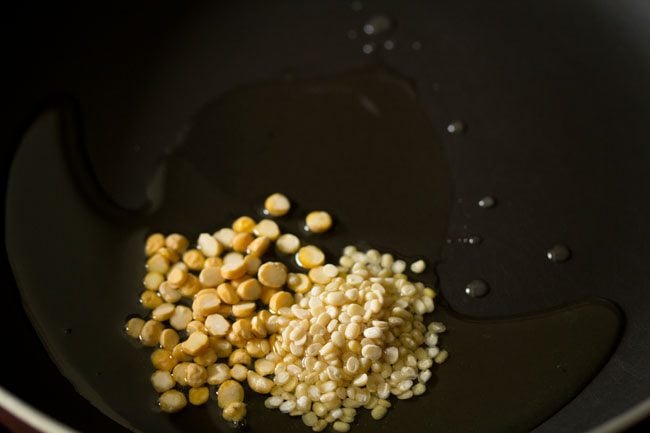
2. Fry the lentils on a low heat.
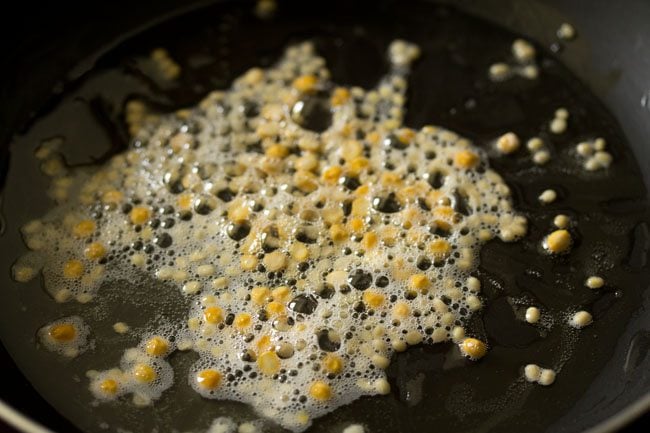
3. Fry until they turn golden and fragrant. Take care not to burn them. The lentils have to be fried well.
Stir often when frying them in the oil. These toasty golden lentils add a nice nutty flavor in the chutney.
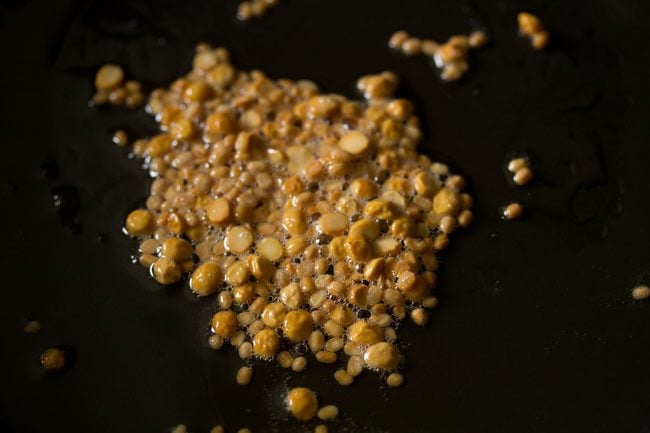
4. Add green chilies. I added 2 green chilies and it made the pachadi spicy. For less spiciness you can add 1 green chili. For a more spicy chutney, you can even add 3 green chilies.
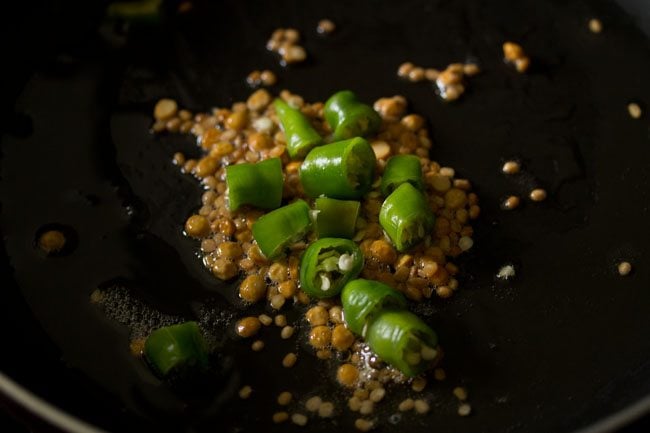
5. Next add 10 to 12 curry leaves. Stir and mix well on a low heat.
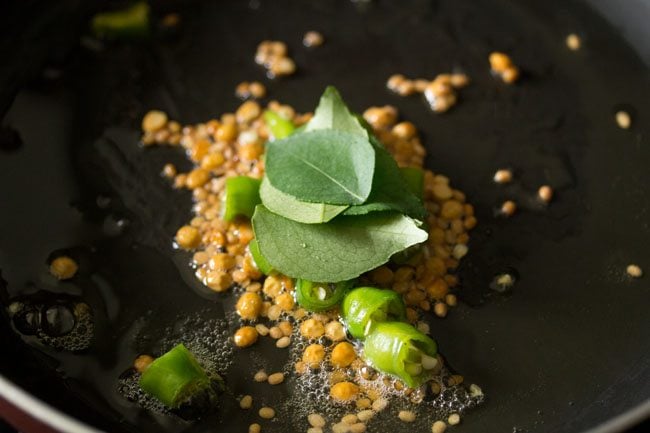
Sauté Cabbage
6. Add 2.5 cups of roughly chopped cabbage. If you prefer, prep your chopped cabbage by blanching it in hot boiling water for 5 minutes. Drain all the water and then add to the pan.
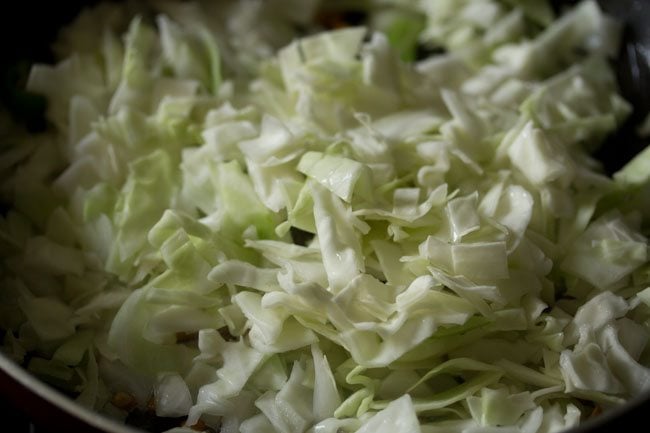
7. Season with salt as per taste.
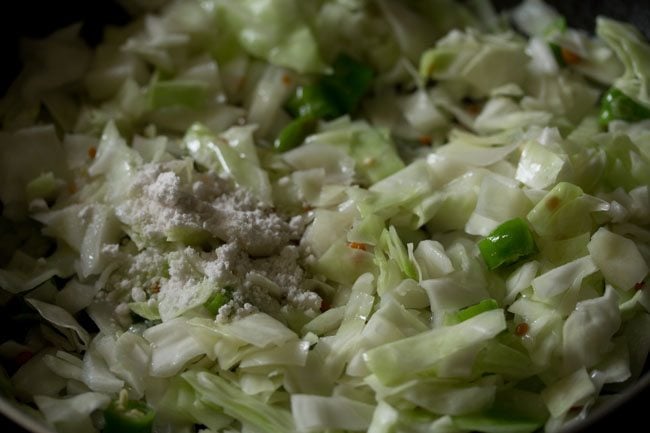
8. Mix very well.
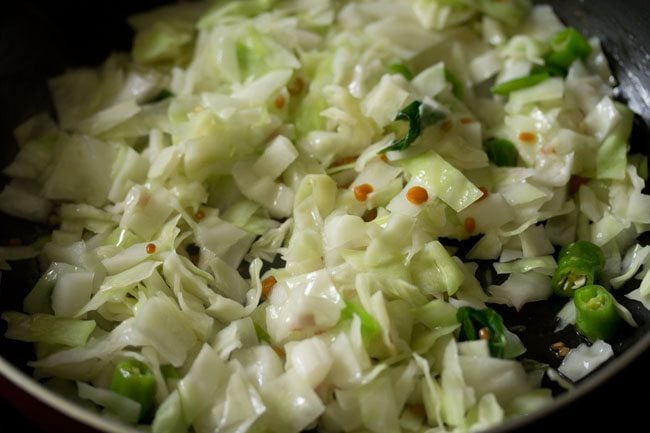
9. Cover the pan with its lid and cook the cabbage on a low heat for 9 to 10 minutes. in between do check while the cabbage is cooking. Stir and again cover & cook.
You do not need to add any water when steaming the cabbage with this method. The cabbage leaves will release their juices while cooking.
But in case, if the cabbage starts sticking to the pan, add a splash of water. Mix, cover and cook on low heat.
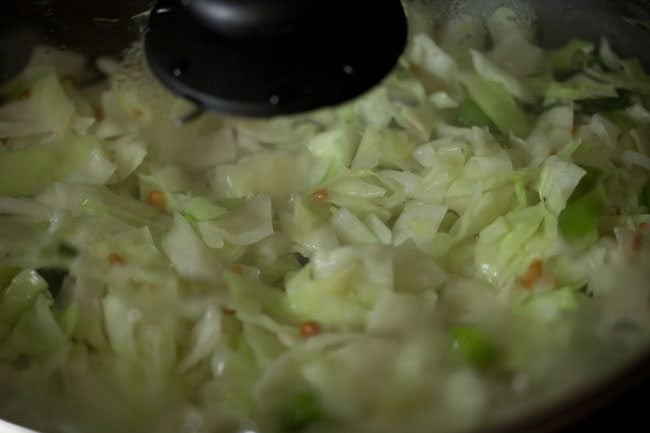
10. The cabbage should be half cooked or almost cooked. There should be a slight crunch in them. Do not cook them completely. Let the cabbage mixture become warm or cool at room temperature.
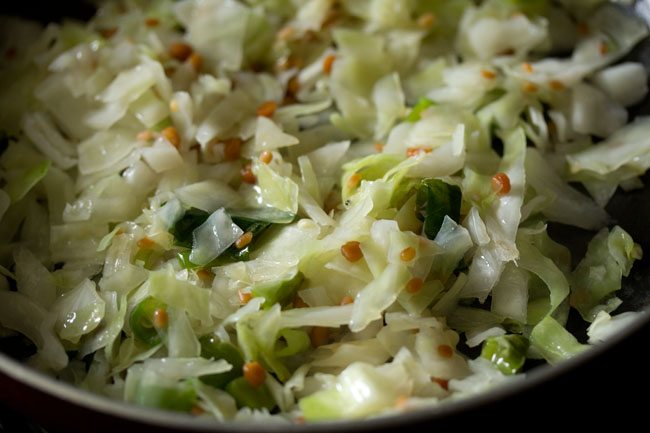
Blend Chutney Ingredients
11. Add the warm or cooled cabbage chutney mixture in a blender or grinder jar. Add 1 teaspoon tamarind.
If you do not prefer the raw flavors of tamarind, which are very tart, then add it after the cabbage has half cooked and sauté for about 2 to 3 minutes further on a low heat.
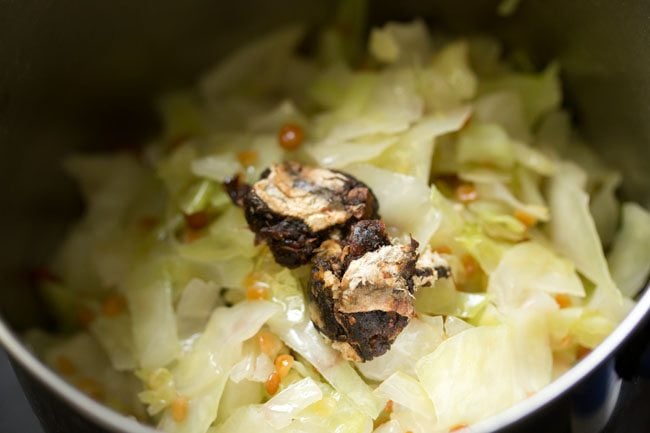
12. Add ⅓ to ½ cup water and grind to a smooth chutney. Ensure that there are no fine chunks of lentils or cabbage in the chutney. It should have a smooth and fine consistency.
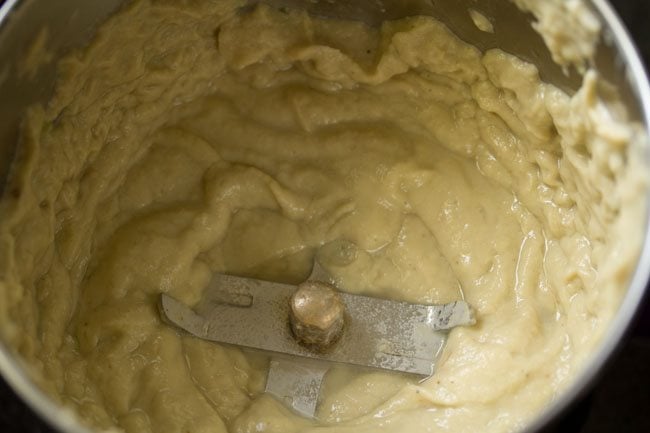
13. Remove the chutney in a bowl. Do scrape off all the chutney sticking at the bottom and sides of the mixer jar and add it to the bowl.
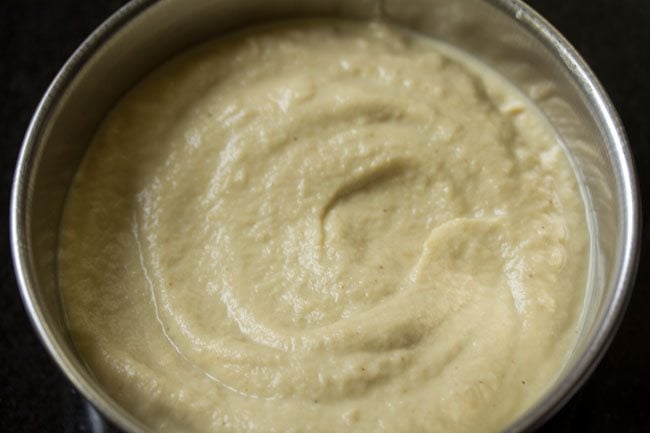
Temper Cabbage Chutney
14. Heat 1 to 2 teaspoons sesame oil (gingelly oil) in the same pan or in another pan. Lower the heat and add ½ teaspoon mustard seeds and let them crackle.
If you do not have gingelly oil, use any neutral oil.
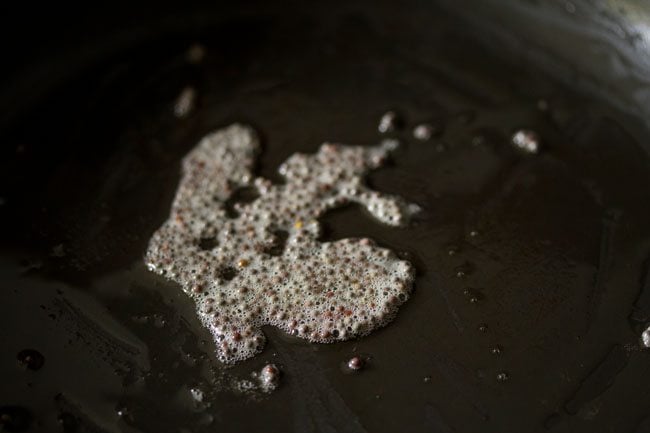
15. When the mustard seeds finish crackling, add a pinch of asafoetida (hing) and 1 or 2 red chilies (broken and seeds removed).
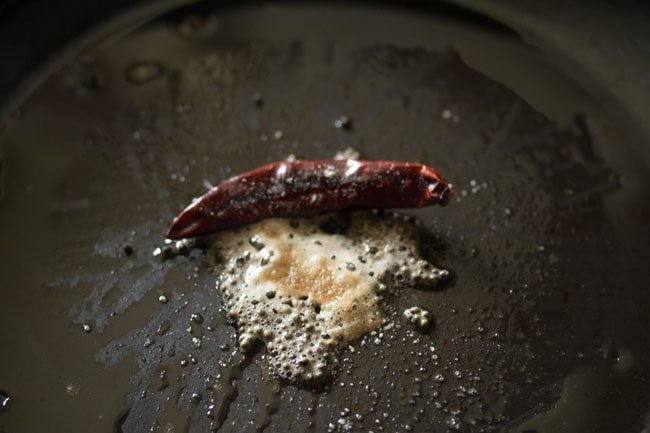
16. Stir and mix well.
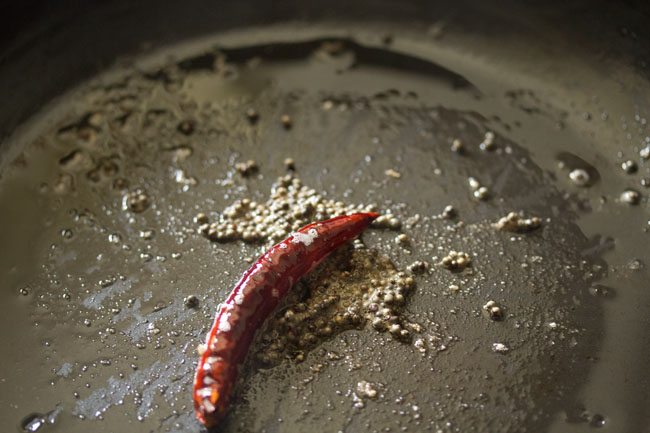
17. Add the entire tempering mixture of spices and chillies (together with the oil) to the ground cabbage chutney. Mix again.
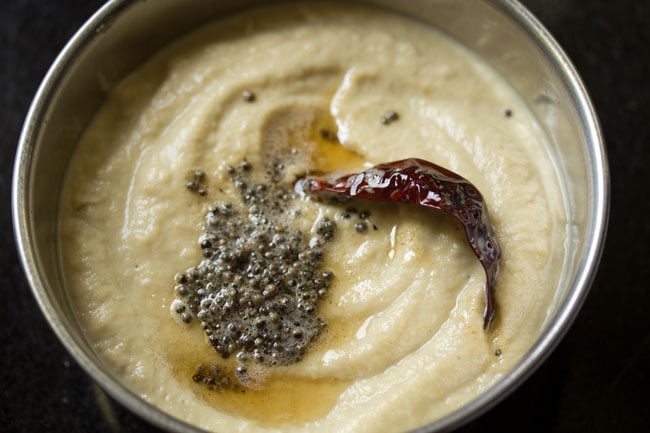
Serving Suggestions
Enjoy the cabbage chutney with South Indian snacks like:
- Idli varieties: Idli, Rava Idli, Ragi Idli, Oats Idli
- Dosa varieties: Sada Dosa, Uttapam, Oats Dosa, Rava Dosa
- Other snacks: Medu Vada, Adai or Upma
You can also serve it as side condiment with Dal or Sambar accompanied with steamed rice.
In fact you can also simply have it with steamed rice or rice gruel (porridge) and some roasted papadums by the side. Mix the cabbage chutney with the steamed rice or the savory rice porridge while eating.
As you see in the photo below, I served cabbage pachadi with dosa and it tasted fabulous.
Storage
If there are any leftovers, store only for a day in the refrigerator. While serving, let the cabbage pachadi come to a room temperature before eating.
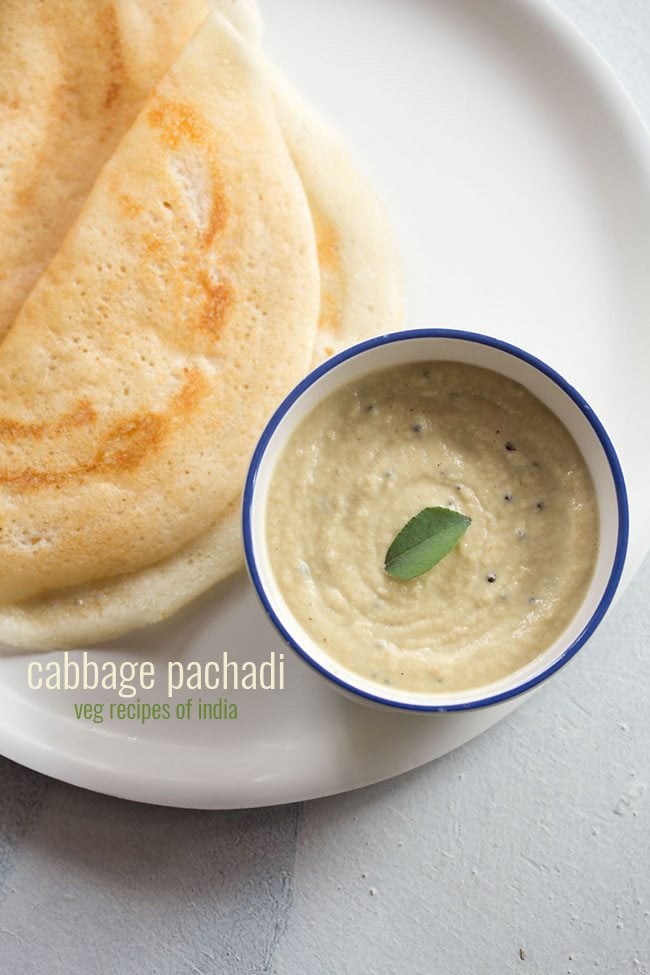
Expert Tips
- Cabbage: To get the best flavor in the chutney, I suggest not to overcook the cabbage. You can cook them until softened but do not make them mushy. In place of green cabbage, use purple or red cabbage for a vibrant colored chutney.
- Tamarind: Swap tamarind, with ½ to 1 teaspoon of tamarind paste or sauce (unsweetened) or as needed to get the sour taste in the chutney. Include lemon juice if you do not have tamarind or its paste. Note that the sour taste with a lemon juice will be different than that of tamarind.
- Lentils: Including lentils in the cabbage pachadi gives it a nutty taste. But feel free to omit them, if you do not have.
- Spices: Green chilies add spiciness and heat in the chutney. If you prefer less spicy chutney, reduce the amount of green chilies. Easily swap dry or fresh red chillies with green chilies.
- Variations: To add some green color to the cabbage pachadi, I suggest to add 2 to 3 tablespoons of coriander leaves (cilantro). You can also choose to add about ¼ to ⅓ cup fresh or desiccated coconut (unsweetened). Add coconut after the cabbage is half-cooked and sauté for 1 to 2 minutes.
- Scaling: The recipe can be scaled to make a small or a large batch to feed people as needed.
More Tasty Chutney Recipes!
Chutney Recipes
Chutney Recipes
Chutney Recipes
Kerala Recipes
Please be sure to rate the recipe in the recipe card or leave a comment below if you have made it. For more vegetarian inspirations, Sign Up for my emails or follow me on Instagram, Youtube, Facebook, Pinterest or Twitter.
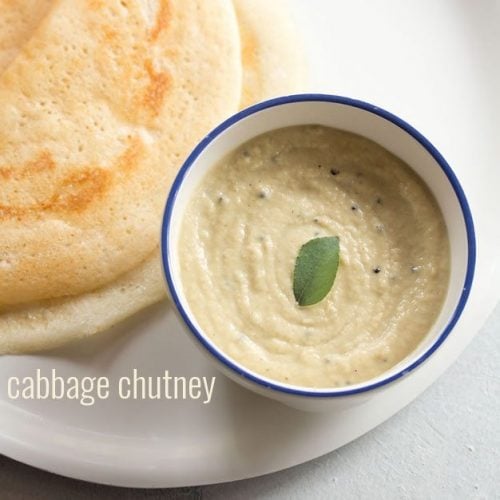
Cabbage Chutney (South Indian Cabbage Pachadi)
Ingredients
For cooking cabbage
- 1 tablespoon sesame oil (gingelly oil)
- 1 teaspoon urad dal (split and husked black gram)
- 1 teaspoon chana dal (split and husked bengal gram)
- 2.5 cups chopped cabbage
- 1 to 3 green chilies – add as needed
- 10 to 12 curry leaves or 1 sprig curry leaves
- salt as required
Other ingredients
- 1 teaspoon tamarind
- ⅓ to ½ cup water – for blending chutney
For tempering
- 1 to 2 teaspoons sesame oil
- ½ teaspoon mustard seeds
- 1 pinch asafoetida (hing)
- 1 or 2 dry red chilies (halved and seeds removed)
Instructions
Sautéing Chutney Ingredients
- Heat 1 tablespoon sesame oil in a frying pan. Add the urad dal (split and husked black gram) and chana dal (split and husked bengal gram)
- Fry the lentils on a low heat till they turn golden and fragrant. Take care not to burn them.
- Add chopped green chilies. For less spiciness add half of a green chili or or 1 green chili. For a more spicy chutney, you can even add 2 to 3 green chilies.
- Next add the curry leaves. Stir and mix..
- Add the chopped cabbage. If you want you can blanch the cabbage in hot boiling water for 5 minutes prior to sautéing the ingredients. Drain all the water and then add the blanched cabbage.
- Season with salt as per taste. Mix very well.
Cooking cabbage
- Cover the pan with its lid and cook the cabbage on a low heat for 9 to 10 minutes. In between do check while the cabbage is cooking. Stir and again cover & cook.
- If the cabbage starts sticking to the pan. Add in a splash of water. Mix and deglaze the pan. Cover and continue to cook.
- The cabbage should be half cooked or almost cooked. There should be a slight crunch in them. Do not cook them completely. Let the cabbage mixture become warm or cool at room temperature.
- Now add the cabbage mixture in a blender or grinder. Add 1 teaspoon tamarind.
- Add ⅓ to ½ cup water and blend to a smooth and fine chutney.
- Remove the chutney in a bowl. Do scrape off all the chutney sticking at the bottom and sides of the mixer jar and add it into the bowl.
Tempering
- Heat 1 to 2 teaspoons sesame oil in the same pan or in another pan. Lower the flame and add ½ teaspoon mustard seeds and let them crackle.
- When the mustard seeds finish crackling, add a pinch of asafoetida and 1 or 2 red chilies.
- Stir and mix well.
- Add the tempering mixture to the ground chutney. Mix well.
Serving Suggestions
- Serve cabbage chutney with South Indian snacks like Idli, Dosa, Medu Vada, Adai or Upma.
- You can also eat it as a side dish with dal-rice or sambar-rice or rasam-rice.
- It also tastes good as a side with plain steamed rice or rice gruel (porridge) and some roasted papadums by the side. Simply mix the chutney with the steamed rice or the savory rice porridge.
Storage
- Store any leftovers in the refrigerator for a day only. Before serving, let the cabbage pachadi come at room temperature.
Notes
- Cabbage: Do not overcook the cabbage and make it mushy as you won’t get the best flavors in your chutney. Swap green cabbage with purple or red cabbage to make a vibrant colored chutney.
- Tamarind: In place of tamarind use ½ to 1 teaspoon of tamarind paste or sauce (unsweetened) or as required to make the chutney sour. Optionally you can also add lemon juice if you do not have tamarind or tamarind paste. Do keep in mind that lemon juice will give a different quality of sour taste than that of tamarind.
- Lentils: Adding lentils in the recipe gives it a nutty flavor. However feel free to skip them, if you are out of stock with lentils.
- Spices: The spiciness and pungency in the cabbage chutney comes from the green chilies. For a less spicy version, reduce the quantity of green chilies. You can easily sub dry or fresh red chillies with green chilies.
- Variations: To make a green colored cabbage pachadi, add about 2 to 3 tablespoons of chopped coriander leaves (cilantro). You can also make a coconut cabbage chutney by adding about ¼ to ⅓ cup fresh or desiccated coconut (unsweetened). Add the grated coconut after the cabbage is half-cooked and sauté for 1 to 2 minutes.
- Scaling: Easily scale the recipe to make a small or a large batch to feed people as needed.
Nutrition Info (Approximate Values)
Cabbage Chutney recipe from the blog archives was first published on September 2016. It has been updated on December 2024.
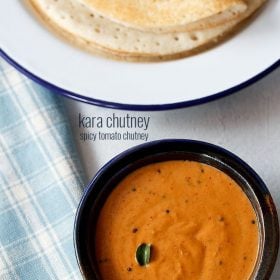
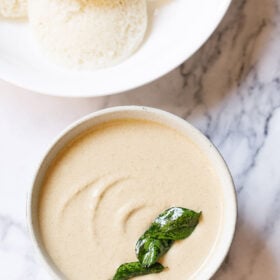
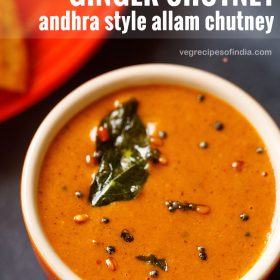
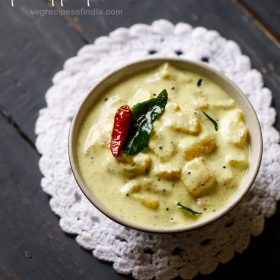
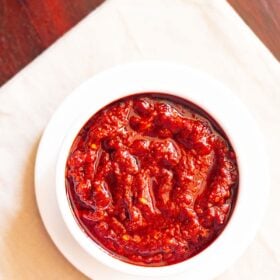
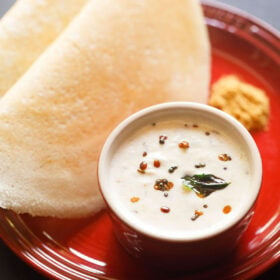
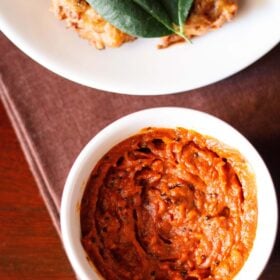








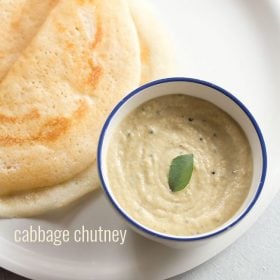
Hi dassana,
I made it with a smaller batch since at home nobody likes cabbage based sabzis much, but I have been asked to make this chutney again soon. This is another one of your recipes that took me by total surprise. I think now I’ll try other chutneys also..
thanks a lot ruchi. this cabbage chutney does not taste like its made from cabbage and it is one of its specialties. there is one more recipe of cabbage which is delicious and difficult to guess if cabbage has been added to it. its cabbage dal (cabbage kootu). you can check the recipe here – https://www.vegrecipesofindia.com/cabbage-kootu-recipe-cabbage-dal/
sure, do try the other chutney recipes too.
Hi,,
Made this cabbage chutney/pachadi just now for dinner and had it with Methi parathas.It’s really awesome in taste and hardly any one guessed it rightly.The only difference is that my chutney color turned out brown and not whitish/creamish as in ur pic. But as far as taste is concerned it’s very delicious (doesn’t matter wot color it turned out)
The crunchiness of the chana and urad dal is like another topping in itself.Also the pungent flavour of cabbage is not there.
From now onwards this chutney would b a regular in my Menu and in front of guests too.?
I would insist everyone who visits this page to try and go for this chutney.
Thanxs for making me known some unknown and out of the box recipe like this.
agree ruchi, no one can guess that cabbage is added in the chutney recipe. you are right, color does not matter. what matters is the taste.
this chutney is also a regular at my place. even i feel that readers should try this recipe. its so good. you can also try cabbage kootu recipe. in this recipe also the presence of cabbage is not much felt. cabbage kootu is also a regular dish at home.
and lastly thanks for the awesome feedback.
Hii Dassanna,
Of late,i m referring ur website for many doubts of mine and liked ur step wise pictorial description of the dishes too.it makes all the more easier to make a dish.
U merely make a complicated dish too look like a simple recipe with ur excellent do and don’ts and other recipe notes.
I already tried Rajma bhaji,gobi 65 and some masalas likes Chaat masala,biryani masala,pav Bhajiwali masala etc,which turned out exceptionally too good and aromatic.Just forgot to buy ready-made from shops after making them at home.?
Soon will try baked items like pav,bread,cakes and cookies too.
I was totally bowled out when I saw a chutney recipe coming out of a vegetable like cabbage which is mostly less liked.Will surely try this soon too.Just hav a doubt b4 trying a hand on it,
whether if I can use ordinary cooking oil instead of sesame oil for the recipe?
Kindly pls let me know.
Thanxs alot and salute to ur passion of cooking and sharing perfectly with everyone.?
thanks a lot pretty for this lovely feedback. glad that you liked the recipes which you have tried so far. do try the baked recipes also.
the cabbage chutney is awesome, if i say so. its damn good. you can use any oil like sunflower or peanut oil.
Brilliant recepie Dear Dassana di…I never thought patta gobhi can turn to such delicious dish….nobody loves cabbage in our family…specially my mom ..but what a surprise. ..she loved ur pachadi?..when I made it.. keep posting fantastic recepies….May GOD bless u always?
thanks a lot samreen for this comment as well as for your kind wishes. thats the beauty and the surprise element of this recipe. i will share one more cabbage recipe along the same lines.
Sure…I’ll be waiting for ur next cabbage recepie??
What can be used instead of Imli?
there is no substitute for imli. other sour ingredients that you can use are dry mango powder or lemon juice. but with both the taste will change.
I want to try
Wow my hubby is big fan of cabbage will definitely try this out
do try niyathi.
Brilliant recipe…. Have to try it soon ?
thanks nikitha, try soon and let us know your views.